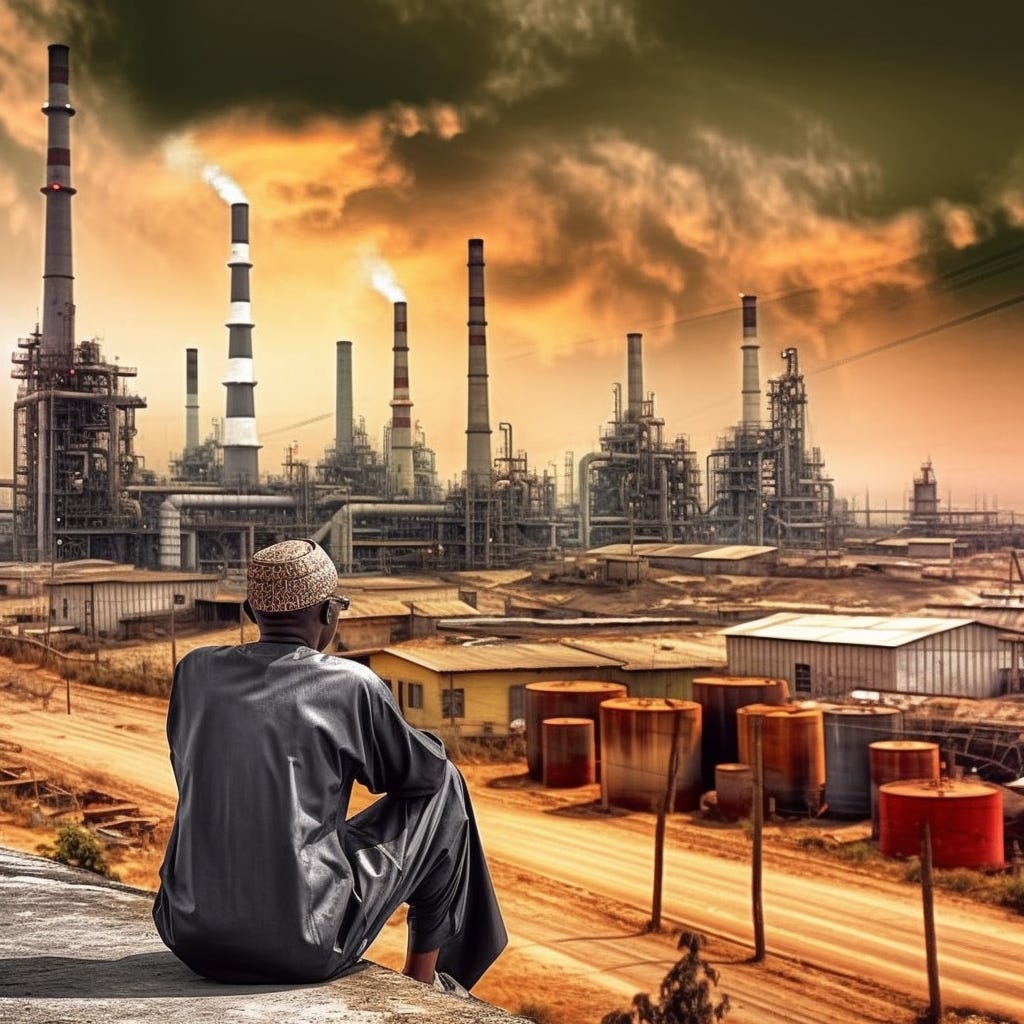After Oil
During my recently concluded residency at Stears, one of the things I talked about was how Nigeria might deal with the inevitable transition away from crude oil. It is a reality that is going to happen — if nuclear fusion doesn’t get there first, climate change surely will.
An argument I made last November was that Nigeria’s gas flaring is making the transition from oil harder than it needs to be. That is, when major oil companies are coming under pressure from climate activists and the general public, they take a global view of their assets and drop the ‘dirtiest’ ones to make their overall portfolio look cleaner. And the amount of gas flared in Nigeria makes Nigeria a very dirty country in terms of the amount of carbon pumped into the air:
And it is not difficult to see why this is the case. According to data from Wood Mackenzie, Nigeria has the highest average annual emissions intensity in the world — more than double the intensity rates in countries like the US, Mexico, and Egypt.
The reason for this? Two words: gas flaring.
Without getting too technical, the summary is that Nigeria has very lax laws when dealing with gas that can’t readily be stored or used. This is best illustrated using the example of one of Nigeria’s best-known oil fields, Agbami. Sometimes the gas in an oil field is held in reserves under the actual oil itself, meaning that you only start to get to the gas when you have depleted the oil to low levels. At that point, you need a solution for the gas that starts to come out with the oil. As Agbami is an old field that is almost dried up, gas production is now increasing. While Agbami can inject some of this gas into Nigeria’s gas reservoirs, the age of its equipment means that they frequently fail, and whenever this happens, the gas is simply flared.
Across the industry in Nigeria, you will find similar examples — where gas is found alongside oil, and there is no solution for the gas. It is simply flared. Those gas flames are, quite literally, a signal to investors in today’s world to avoid Nigeria for the sake of the overall health of their portfolio.
The rest of the article is here if you are interested.
A lot is going to happen on the destination to the end of oil and the Wall Street Journal has highlighted one in a new piece:
Under pressure from shareholders and activists, major energy companies are retreating from higher-polluting and riskier projects around the world. A bunch of smaller companies are rushing in to fill the void.
In Nigeria, smaller companies now hold nearly half of the country’s oil and gas oil leases acquired from major companies that have retreated in recent years. In Latin America, an independent firm has pushed into oil exploration in areas eschewed by Occidental Petroleum and BP. In Asia, Chevron is pulling out of a controversial gas project in Myanmar, and a little-known Canadian firm has agreed to snap up its stake.
Here’s more:
In Africa, the stakes held by major oil companies in fossil-fuel projects are set to shrink to 50% in 2025, from 65% in 2019, according to Rystad data. Meanwhile, the value of new oil deals in Africa reached some $21 billion last year, more than four times the $5.5 billion worth of deals registered in 2020.
Most of the world’s biggest energy companies have invested heavily in low-carbon strategies in recent years, while dialing back on fossil-fuel exploration and production except in their most profitable regions. Chevron, Shell and Exxon, for example, have left Nigeria, Ghana and elsewhere amid promises to reduce emissions as well as mounting security challenges related to oil thefts and lawsuits over pollution.
It goes on to make the point about gas flaring I made in my Stears piece:
In Nigeria, gas flaring — an emissions-heavy process that burns the natural gas associated with oil extraction — has increased by 10% over the past decade. Meanwhile, smaller companies, including Aiteo Eastern E&P, have been increasing their share of operations in the country, according to data from Capterio, a U.K.-based firm that tracks gas flaring and local environmental groups. Aiteo didn’t respond to multiple calls and written requests for comment.
This is all very interesting for a number of reasons. Yes, smaller companies are a lot more nimble with a shorter chain of command meaning they don’t have to seek approval in Texas or London to get a budget to drill a well in an African country. They are also much more immune to pressure from climate activists as most of them are unlikely to be listed for a start. So for countries like Nigeria losing a lot of investment from the oil majors, this might be a case of something being better than nothing.
But there are downsides too. It is definitely much harder to hold small companies to account for accidents or any damage. Gas flaring causes significant environmental and human damage with a much higher incidence of respiratory diseases in the communities in the areas where gas is flared. As the extract from the WSJ piece above says — flaring has increased as the big companies have exited. Do smaller companies have better technology or access to capital for oil drilling? I guess the answer to that is a subjective one. And at what point does Nigeria begin to engage and grapple with the transition away from oil that is inevitable even if small companies are giving it a dead cat bounce?
Plenty to ponder.


